Iphone and Android Which One is Easy to Track
iPhone vs. Android: Which is ameliorate for you?
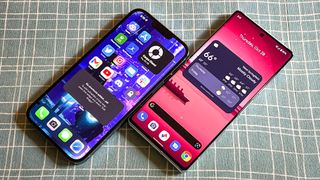
The fight of iPhone vs. Android volition probable never take a real winner, but we're going to endeavour and aid y'all to find your personal pick notwithstanding.
The latest version of both operating systems — iOS 15 and Android 12 — are both first-class, but in slightly unlike ways. Many of their features overlap, but blueprint-wise they look quite different, aside from the bones touchscreen-focused layout. Whichever of the all-time phones bachelor today you lot purchase, they'll be running one of these ii OSes.
Pitting iPhone vs. Android, we accept a expect at the corresponding strengths of each mobile platform, and so you can pick the right one for you the adjacent time you buy a smartphone. If you want to see the electric current flagships for Android and iOS, be sure to check out our Pixel half dozen vs. iPhone thirteen face up-off. And if you lot're convinced y'all want to leave your iPhone, read more about Google'due south new Switch To Android app that volition assist you move over.
Exist sure to bank check out our iOS 15 review and Android 12 review for more in-depth looks at each new Os version.
iPhone vs Android: Why iPhone is better
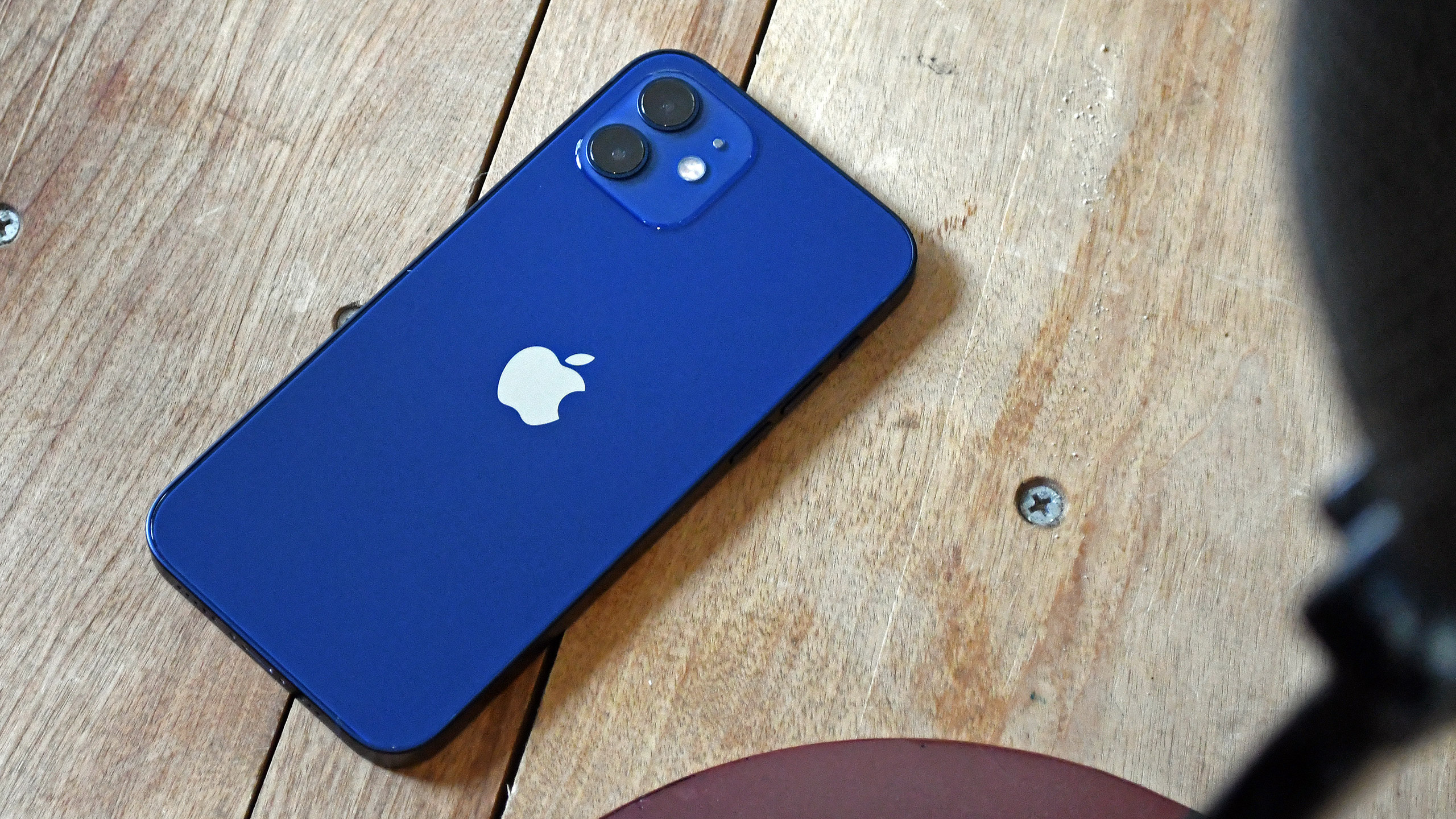
You lot're invested in Apple'due south ecosystem. This might seem like a shallow reason, just Apple apparently makes a broad breadth of tech products, and if you already own a Mac, iPad or Apple Watch, getting an iPhone makes a lot of sense.
Apple has designed a multitude of continuity features that let you to carry over work and information from one of its devices to some other, and these features can certainly salve you lot time. Accept Handoff, for example, where calls on your iPhone and web pages in Safari can move seamlessly between iOS and macOS. Universal Clipboard makes text copied on i platform usable on the other. Another one of our favorites is Continuity Photographic camera, which allows you to have pictures and scan documents using your iPhone's camera, and then view and edit them on your Mac. You can even complete purchases on your Mac by using biometric hallmark features on your iPhone via Apple tree Pay.
Only a handful of Android telephone makers take hardware ecosystems that approach Apple's, and even for some that come shut, like Samsung, you won't get the depth of integration possible betwixt the iPhone and other Apple-congenital devices. Microsoft is helping Google shut the gap somewhat with its new Your Phone app for Windows, which allows Android users to reply to texts and notifications on their PCs, though the experience is a little clunky and there is even so work to be done.
There are many other cracking examples of continuity across iOS, iPadOS, watchOS and macOS — and the iPhone is a critical component in that puzzle, specially now that iPhone apps can be seamlessly ported to macOS. Ability users already immersed in Apple'southward ecosystem can stand to gain a lot past calculation an iPhone to their repertoire. And that's to say zilch of friends and family unit members who prefer to apply iMessage and FaceTime to keep in touch.
The third-party apps are just improve. This 1 is definitely down to personal preference, but as someone who has jumped back and forth betwixt iOS and Android, I've been consistently blown away by the quality of apps built by iOS developers, and mostly disappointed in their Android counterparts.
Don't become me wrong — in that location's great software and developers on Android, but they're harder to find, in my experience. One of our favorite Twitter apps, Tweetbot five (opens in new tab), is an iOS exclusive, for example; by dissimilarity, 1 of the best 3rd-party Twitter apps we've encountered on Android, Fenix ii, strongly pales in comparing. One of our staff members, Henry T. Casey, loves using Deport (opens in new tab) to etch blog posts on his Mac and iPhone, but we've struggled to find a annotation-taking app on Android as comprehensive and slick.
You lot may even find that apps from established companies, ranging from banks to airlines, are a bit smoother and cleaner on iOS than Android, with better integration with the phone's core services, similar Wallet.
At that place's a bigger pick of accessories. Walk into any Best Purchase or Target, and you'll find aisles of cases for every iPhone that Apple makes — something that certainly cannot be said for the Android contingent outside of flagship devices from the biggest companies. Once you go past the semi-good for you selection of products made for the latest Galaxy South device, you're out of luck. Don't bother expecting a choice of accessories for your new Pixel or Motorola handset at whatever brick-and-mortar retailer. Sure, you could get online and snag a $4 case off of Amazon, but and then you lot're guaranteed to become what y'all pay for.
The selection and availability of iPhone cases, screen protectors, auto mounts and other goodies is simply far greater than you'll find for any other phone, and that's more important than most people realize. iPhone owners volition never have the problem of non finding a case to their liking.
There are enhanced privacy controls with app tracking notifications. 1 of the biggest contempo iOS releases introduced app tracking notifications, allowing you to opt out of apps tracking you beyond your telephone. This was a major win for privacy advocates and a huge blow to many third-party companies, like Facebook.
Android just doesn't have this feature and we dubiety it ever will. Don't get stuck in the belief that iOS is inherently more individual than Android, since Apple still collects a ton of information about you, but iOS still has a chip more resilience when it comes to third-parties. It's so satisfying to deny an app the ability to track you.

There'south no bloatware. No affair how you buy your iPhone, where you buy it from or what iPhone yous purchase, y'all won't see whatsoever bloatware preinstalled when you boot information technology upward for the get-go time. That means it's clean from the very first, with no ability- or information-siphoning apps you didn't ask for sabotaging things behind the scenes.
That'due south a relief if you've ever seen the style a new Android phone arrives out of the box — particularly ane that you lot've bought through a carrier. Fifty-fifty spending $1,800 on a Milky way Z Fold 3 doesn't spare AT&T customers from the affront of seeing software like CNN and DirecTV At present cluttering their app drawers. And it can exist even worse if y'all purchase a budget handset that has been heavily subsidized by a disbelieve carrier.
Android buyers who buy 1 of the best unlocked phones without a service understanding volition accept better luck avoiding bloatware. Information technology besides depends on the visitor. For instance, unlocked Pixel phones aren't mired down by any 3rd-party apps; on the other paw, it's not totally unheard of for some unlocked handsets to come with the odd unwelcome sponsored software (or ads).
You get quicker software updates. Android phones get fewer updates than iPhones, and when they exercise, they happen less frequently and are often delayed with the exception of Google'southward Pixels.
The number of updates an Android phone sees over the grade of its lifetime depends largely on how expensive it is, what carrier you lot buy information technology from (or if it's fifty-fifty purchased from a carrier at all) and what the phone maker's software support policy is.
That'southward a far cry from iPhones, which are supported with major software updates for many years, no matter what. Take the iPhone 6S, for example, which received iOS 15, even though it originally launched with iOS 9 back in 2015. For comparison, consider Samsung's Galaxy S6, which launched the aforementioned twelvemonth and started with Android five.0 Lollipop. Non only does it lack the latest Android software, but it stopped getting updates years ago. It simply made information technology as far as 7.0 Nougat when Samsung pulled the plug on support — and when the S6 did go Nougat, it arrived in March 2017, viii months after Google unveiled the update.
What's more, when a new iOS version is released, it is bachelor to anybody on the same day, at the aforementioned time, and can be installed on all models that support it instantaneously. By contrast, Android releases are rolled out in waves to individual phones, non just by model.
It has improve retail back up. Let's say something goes horribly incorrect with your iPhone, and y'all demand to go information technology serviced. Or perhaps y'all want a screen protector installed on it, and you'd rather accept it handled by a professional, who will slap that film on with nary a chimera or speck of dust. Whatever your issue is, it'south prissy to have a place to become — and what better place for iPhone users than the Apple Shop. Yes, Covid restrictions can make this difficult, merely at least you have the option.
Owners of Android phones don't necessarily relish that luxury. If you need a new battery or a screen replacement and you lot didn't purchase a protection programme from the retailer you bought it from, you'll probably have to ship it back to the manufacturer. That's quite a time-consuming hassle, given how much we all depend on our phones day in and day out. Some reputable repair shops like uBreakiFix aid bridge the gap a bit, similar for Pixel phones.
iPhone vs Android: Why Android is ameliorate
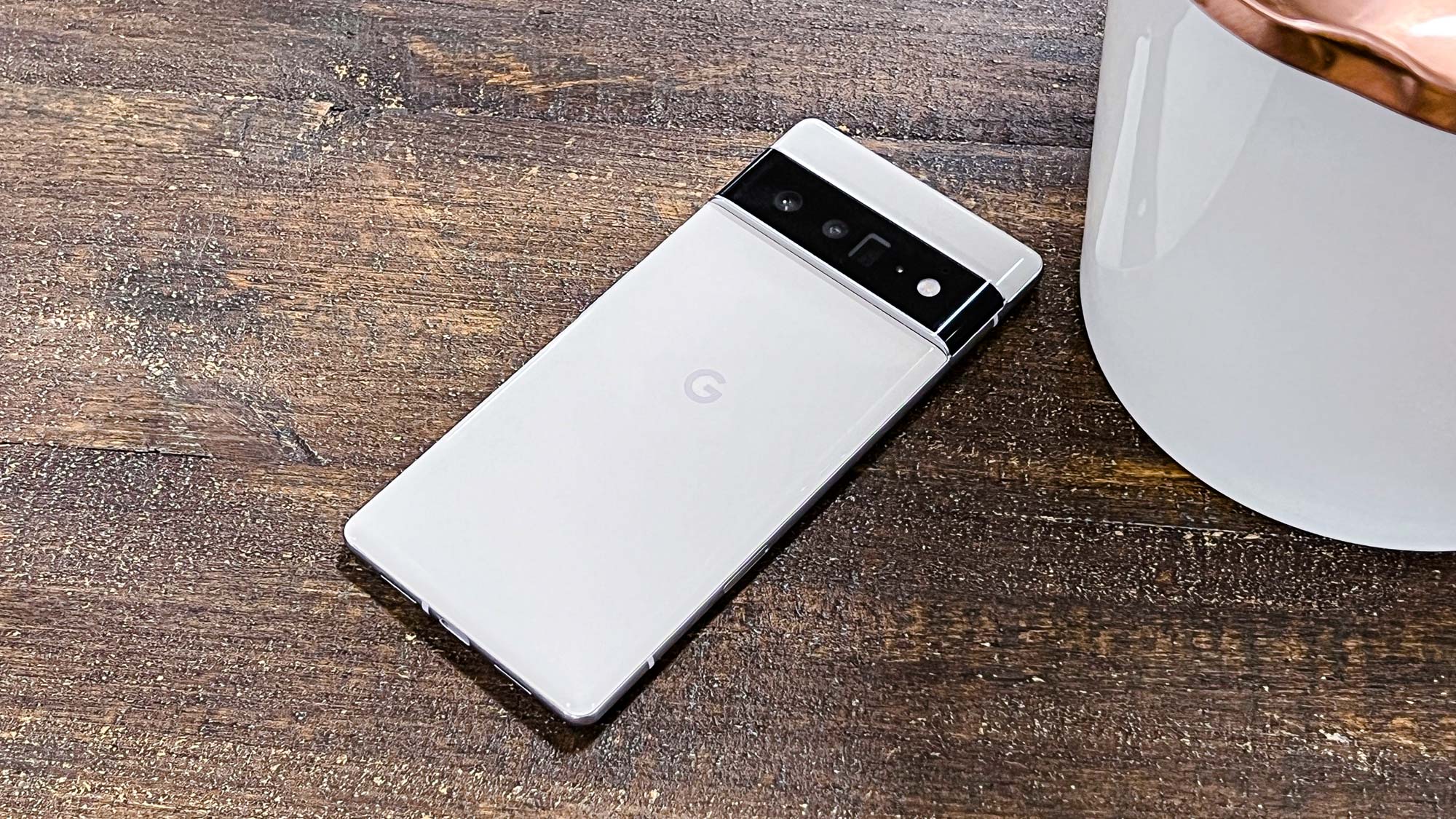
There are phones at every price. The vast majority of the earth's smartphones run Android, and because and so many companies build Android handsets, they're available at every price range. At that place are cheap phones nether the $500 mark like the Pixel 5a, equally well as some of the all-time small phones and all-time large phones, and phablets and foldables far exceeding $ane,000. No matter how much you can spend, chances are you can discover an Android device that fits your budget or offers exclusive features.
The same cannot exist said for iPhones, which historically have been expensive at launch, only to come up down in toll after successive generations. One of the well-nigh affordable new Apple handsets is the iPhone 13 mini for $699, but that comes with a small 5.4-inch display. The Galaxy S21 FE has the same cost but comes with a bigger and smoother 120Hz 6.4-inch screen, a telephoto lens and a much larger battery. Then in that location's the fantastic $599 Pixel 6, if you can notice ane in stock.
The least-expensive iPhone that Apple offers is the iPhone SE (2022), which is a fantastic device with astounding performance for just $429, though its design is dated, and its screen will be too small for some.
Information technology'south more customizable. Though both iOS and Android have evolved over the years, Android has always had a reputation for being the platform for users who like to tinker and personalize their devices. That starts with the home screen launcher, which offers dynamic widgets and the ability to place apps anywhere on a page or in a drawer, out of sight — something the iPhone has only recently defenseless up to with iOS 14. Y'all can even swap out your Android telephone's launcher with an alternative downloaded from the Google Play store.
Android also lets y'all download 3rd-party replacements for cadre services — similar web browsers, keyboards and media players — and set them every bit the default versions if you adopt a 3rd-party app to one that was preinstalled on your phone. iOS has improved in this regard over the years, though the implementation is even so somewhat clunky.
Finally, we have to talk about manufacturer skins — bespoke user interfaces and Android system software that are customized by certain phone makers, offering extra features and, often, the power to create themes for your experience from meridian to bottom. Some Android fans prefer Google'south "stock" interpretation of Android. However, but lots of users like phone makers' custom software, like Samsung's One UI or OnePlus' OxygenOS, considering of their extra capabilities, such as the ability to take scrolling screenshots and hide photos and videos in password-protected folders.
But Google changed things up with Android 12, which brings with information technology the new Material Yous design linguistic communication. This direction builds upon the last several years of Android's expect and feel, offering more personalization. There's a pseudo-theming organisation which adapts to the colors in your wallpapers and applies that shade system-wide. How the likes of Samsung and OnePlus tweak things in their own skins remains to be seen.
You can (sometimes) expand the storage. Although expandable storage is somewhat less popular these days, some Android phones still offering it. This allows you to apply a microSD card to go on photos, apps and other media that won't fit on your device's internal memory.
That'south an astonishing benefit, given the exorbitant prices that Apple and other phone makers charge to double or quadruple storage when you buy your handset. Why tack on another $100 to $150 to the price of a new phone but for an extra 128GB or 256GB of storage (that you're non even certain you'll need) when you tin just drop $seventy on a 512GB card later?
Additionally, while it's certainly becoming more of a rarity on loftier-finish phones these days, some Android devices still come with headphone jacks — a hotly requested characteristic Apple retired from its phones in 2016. That'south a big deal to people who still dear to utilise their trusty old wired headphones.
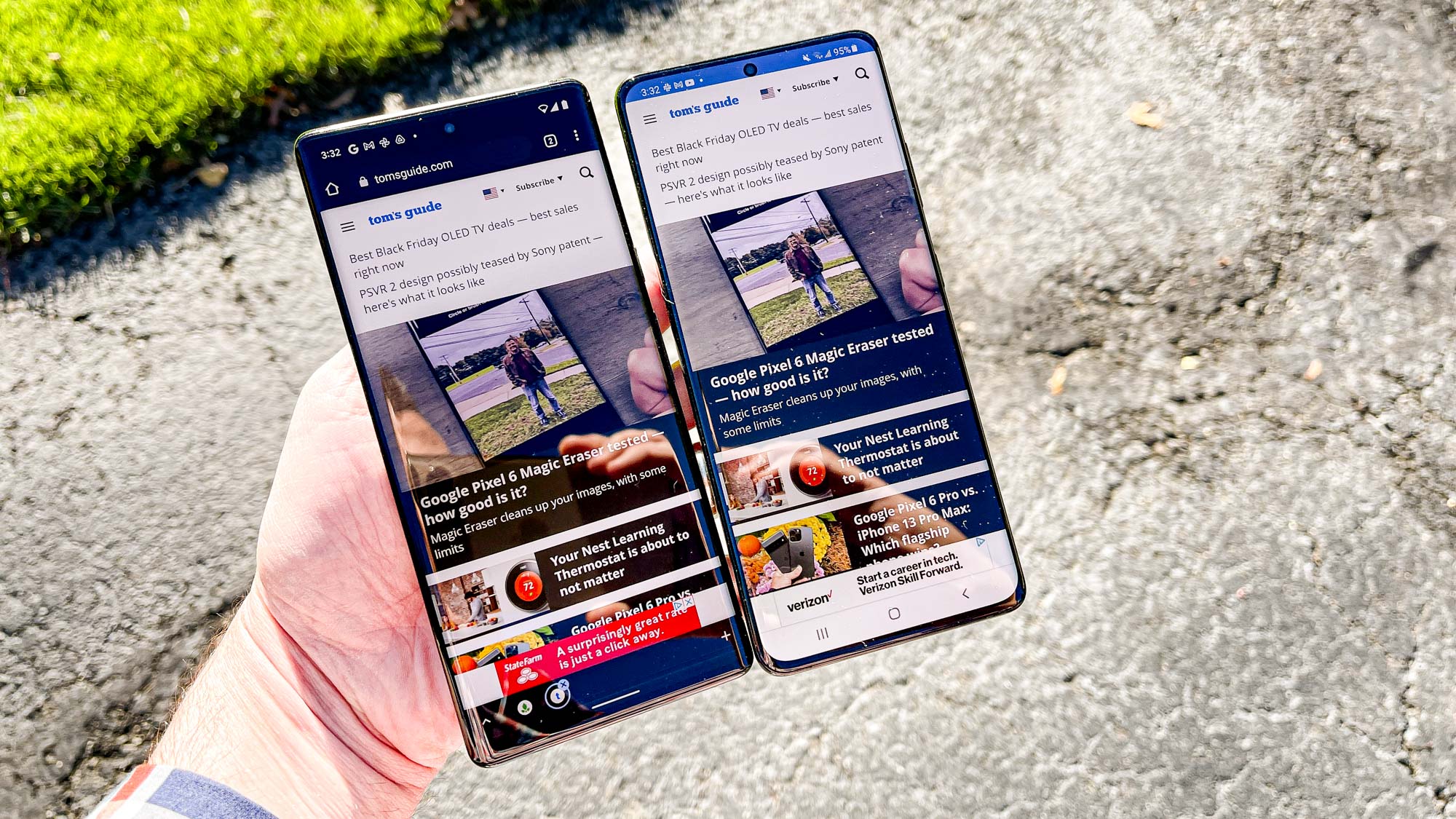
USB-C is universal. Android phones largely rely on USB-C ports for charging and information transfer these days, which is super user-friendly if you're ane of those people who really likes to pack light and bear but one cable. USB-C is also on many PCs these days, equally well as on the Nintendo Switch. Information technology's a cute thing.
Whereas Apple'southward Lightning cable is a relic of the days when every tech company felt compelled to develop its own proprietary connector, USB-C represents the ideal single-port solution the industry is working toward. Information technology besides opens doors to faster charging technologies.
The OnePlus 9 Pro, for example, can accuse from nix to 61 pct bombardment chapters in a mere 15 minutes. Expect for 30 minutes and y'all'll take a bombardment that's 99 percent full.
Compare that to the iPhone 12, which continues to stick with Lightning. And Apple tree no longer fifty-fifty includes a charger in the box.
There's an actual file system (with drag-and-drop support on PC). Most people don't need to get their easily dirty with their smartphone'south file organization. Still, it's good to know that Android gives you that option, if you desire it. Even amend, when you lot plug an Android handset into a Windows PC, you tin very easily elevate and drib files into folders, as if the device were just some other bulldoze.
That means your media libraries and documents are a snap to acquit over and store locally, and y'all don't have to subscribe to a monthly cloud service if yous have an especially big library. iPhones obscure the file organisation from the user for everything except photos, which can be very frustrating for dealing with music, documents and other forms of media.
Some Android phones, like the Galaxy S22 Ultra, even have special PC or display projection features, that allow you use view and utilize your device in a desktop capacity. Samsung's DeX interface is one such instance of this. With such versatility, a high-cease Android phone could legitimately office as a replacement for ane of the best Chromebooks or similarly ultraportable laptops.
Innovative features usually land on Android phones beginning. Sure, Apple'due south coffers are pretty stacked. However, it is just 1 company, with one philosophy. As a result, iOS can be slow — or at least slower than the Android community — to adapt to emerging technologies.
With and then many companies building Android phones, it's piddling surprise that Android partners tend to beat out Apple to the market with innovations in the mobile infinite. Wireless charging, fast charging, NFC, 4G LTE, 5G, OLED displays, in-screen fingerprint sensors, water resistance and multi-lens cameras all landed on Android devices before iPhones, every bit well as software breakthroughs similar true multitasking, copy and paste and multiwindow back up.
Of grade, this isn't to say Apple hasn't delivered breakthroughs of its own. The iPhone X wasn't the first phone with face recognition, merely it was the first with one that worked reliably and securely. However, far more Android phones are released from a variety of vendors every twelvemonth, and then information technology's just a matter of scale that hardware running Google's platform is swifter to adapt.
iOS xv vs. Android 12
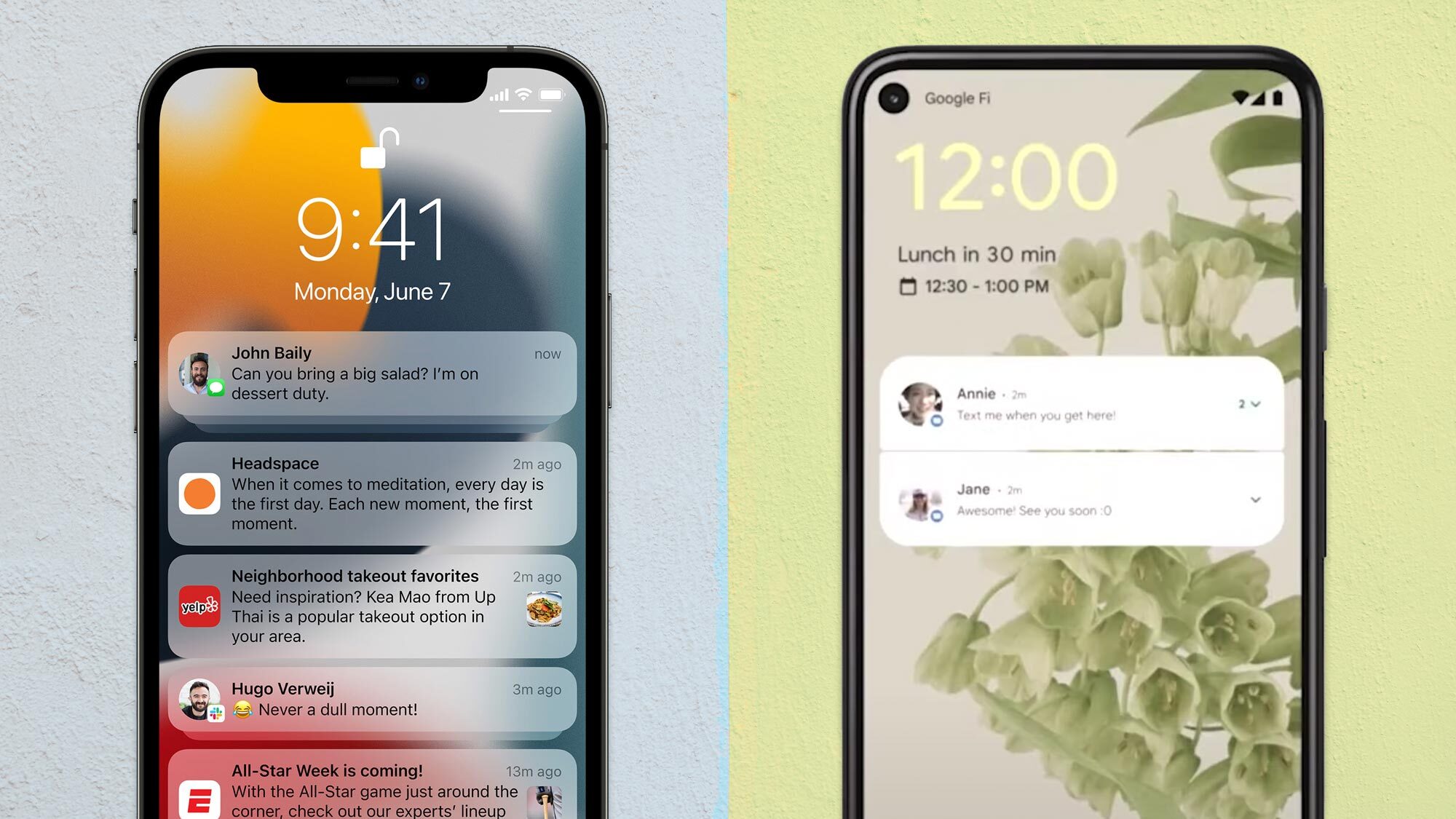
Beyond the core iOS vs. Android argument, nosotros have the large updates for both operating systems. Android 12 is a huge design shift from previous versions, offer the Material Y'all design language that caters itself to you with casual theming. There's also a new privacy dashboard and a whole host of other features. If y'all're interested, bank check out our Android 12 article.
With iOS fifteen comes the new Focus style and a slight overhaul to notifications, revamps to many core apps like FaceTime and Wallet, and a bunch more that nosotros don't accept time to discuss here. If y'all're interested, check out our iOS xv coverage.
Simply neither of these updates changes Android'southward or iOS' strengths, merely fortifies them. And despite a world of difference between the two, there's a lot of overlap. Notifications in iOS 15, for example, are getting as close to Android's as possible with Apple outright copying the model. Android 12 is taking privacy more seriously, with very iOS-like microphone and camera indicators when either or both of those are active. And they both now feature breakdowns of what your apps take been doing lately.
Both the Pixel half dozen and iPhone 13 showcase the all-time that the two operating systems have to offer. From camera and display upgrades to new advancements in AI and machine learning, it'south the best year yet for Android and iOS fans alike. And if yous're platform-agnostic, you have even more to look frontward to.
Android 12 and iOS xv look wildly different and still take their cadre pattern philosophies intact, but now more than ever, they're remarkably similar. The things I've talked almost in a higher place remain true, so your decision on whether iPhone or Android is better for you lot comes downwards to which of the strengths appeal more to yous.
But we're gearing upward for Android 13 and iOS 16, due to release subsequently this year. That could bear on this comparing.
Which should you choose?
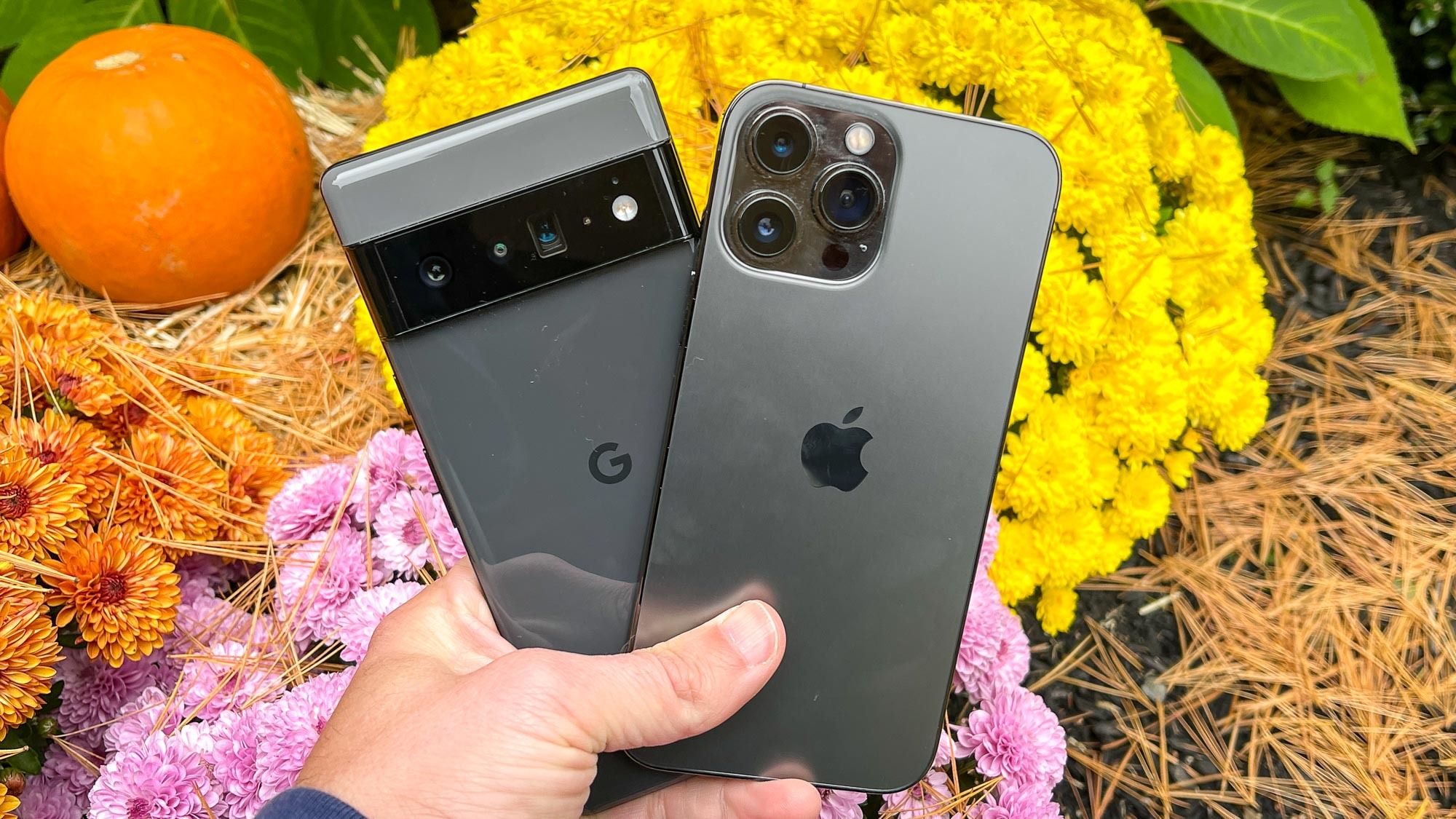
So and then, iPhone or Android: Which should you lot choose? Both platforms have pros and cons, and, as with many purchase decisions, your pick will depend on what you value nigh.
Owning an iPhone is a simpler, more than convenient experience. There's less to retrieve about, and because Apple'south iPhone represents the single virtually popular brand of smartphone, there's an abundance of back up everywhere you go — whether you demand your battery replaced or you're just trying to pick up a new case.
Android-device ownership is a fleck harder in those respects. Yet it'due south simultaneously more freeing, because it offers more selection — selection of how much you want to spend, choice of hardware and software features, and choice in how you organize and personalize your experience. If you're extremely particular well-nigh the technology you use, you might find Android more than liberating — dare I say, fun — though you'll also likely lament the relative lack of high-quality apps (e.g. Twitter) and accessories.
If you lot're wondering which detail device you should switch to, at that place's no improve place to beginning than our lists of the best iPhones and best Android phones. Whichever device you pick, just make certain it fits with your operating organization preferences.
Source: https://www.tomsguide.com/face-off/iphone-vs-android
Postar um comentário for "Iphone and Android Which One is Easy to Track"